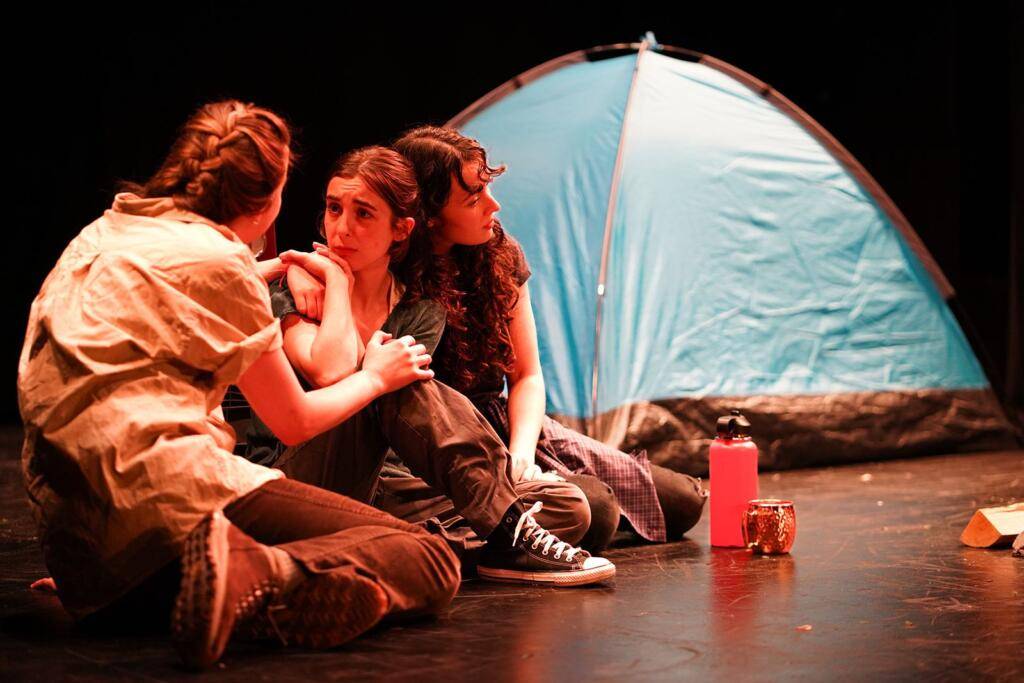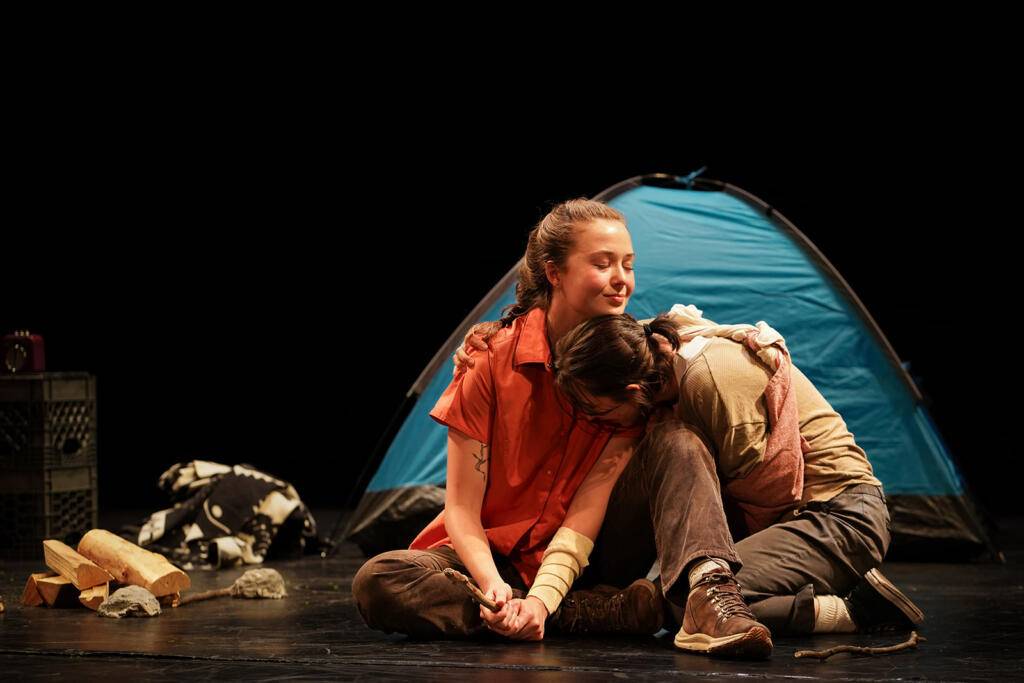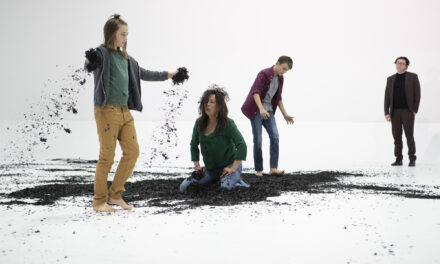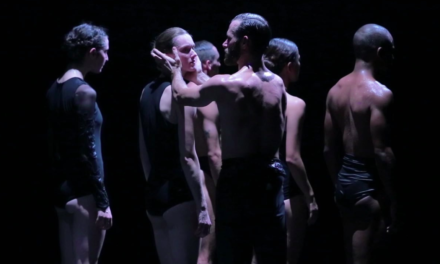It’s no secret that I’m an advocate for feminist, queer theatre. Or that I enjoy worlds of the fantastical variety, toeing the line of reality and imagination just so, crafting realization in the guise of escapism. So it is truly no surprise that I enjoyed Sarah Groustra’s Radio Man, presented by SheNYC Arts as part of their 2023 Summer Theater Festival. Dealing with darkness and destruction of habituation, this one-act script holds rapt attention until its bloody conclusion.
It begins on a near-empty stage. Lights dim on a mismatched collection of pots and pans, triangulated firewood, a deflated tent; a spotlight arises with anticipatory energy on a transistor radio. It crackles. It waits. And then, it speaks, a masculine voice reading aloud. Alternately, it will recite Frost, Shakespeare, all the classics an American schoolchild grows up learning. There is something deeply comforting about it, and, in the spotlight and the static, something deeply menacing, a tragic Feste.
It is within this atmosphere that we meet Mary Grace and Helena (Lisa Naso and Emma Mineo, respectively), two sisters surviving the dystopian hellscape that was once Michigan. The former, an adolescent with scant memory of her now-dead parents, carries herself with an emotional stilt, a curiosity and an infantilization that provides dynamic contrast to her older sister. The latter holds the conditioning and fear of one forced to grow up too fast: she carries herself with a maturity long-bypassing her twenty-one years. Following a horrific event, the two live in chosen isolation. This careful avoidance is shattered by the arrival of Vera (Claire McPartland), a bloodied young woman desperate for medical help.
Following Vera’s entrance, Radio Man explodes (literally, with this world’s inconsistent registering of the Richter scale) into a 90-minute cerebral exploration. There is very little physicalized action within the piece. Rather, Groustra chooses to address an often-unexplored apocalyptic truth: that of boredom, dread, and numb nostalgia. The sisters’ routine remains the same, despite Vera’s appearance shaking their infinitesimal shred of comfort: the now-three gather water, attempt to scavenge, watch for approaching threats, listen to Radio Man. The only thing that changes is their verbal confrontation of who they were and who they’ve become.

Claire McPartland (L), Lisa Naso, and Emma Mineo in Radio Man. PC: Danielle DeMatteo
The stillness of Groustra’s play, as directed by Mackenna Goodrich, is both its greatest strength and strongest threat. Feeling rather documentarian (or a touch Brechtian, if you will) in its approach, the reality of dystopian boredom compels some audiences and repels others. For myself, I was drawn in by the very simplicity of the piece: I felt the words land with a harsher pop, a gentler caress, than I perhaps would if further movement was involved. The organic physicality of Naso, Mineo, and McPartland was, to my view, a thing of divine humanity. To others, however, the frequency with which the women sat cross-legged, sight focused, hands fidgety but understated, caused a wandering eyeline. The play’s Stoppard-style mentality is as divisive as it is necessary.
It is worth noting here the truly remarkable performances of this three-hander. At the time of this publishing, Emma Mineo has received the Festival’s award for Best Leading Actor in a Play, and for good reason: her quiet, easy commandment of the stage is something nearly unteachable; her depth of understanding and understated portrayal of trauma created the most beautiful impact. Naso’s balance of dangerous naivete with philanthropic desire, held within the representation of a youthful body, was wrenching. And McPartland’s performance of the unreliable turned martyr is a study in Chekhovian control, easeful vulnerability, and strength without stereotype. It is the trio’s dynamic—organic, deep-set, unbelievably grounded—that made this piece what it was. Its crimson finale would not have held such tragedy if one weren’t completely rooting for these three.
Though there were some questions raised—is Radio Man allegorical? Does a lost brother soliloquy need to be placed in the structure? How long does the final sequence truly need to be?—and a bit of worldly inconsistency for my own mind, I felt the emotional impact settle deep within my ribcage. In this exploration of sisterhood, relationship, trauma and recovery, division, and human connection, there is such power. I hope it finds a wonderful path forward.

Claire McPartland and Lisa Naso in Radio Man. PC: Danielle DeMatteo
To learn more about Radio Man, visit Sarah Groustra’s website here.
This post was written by the author in their personal capacity.The opinions expressed in this article are the author’s own and do not reflect the view of The Theatre Times, their staff or collaborators.
This post was written by Rhiannon Ling.
The views expressed here belong to the author and do not necessarily reflect our views and opinions.


















